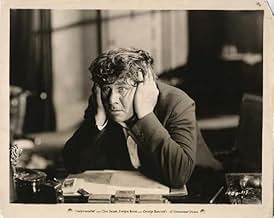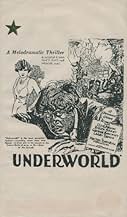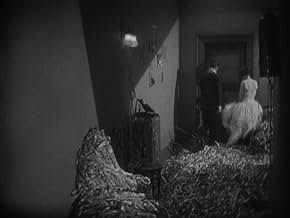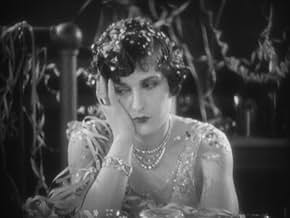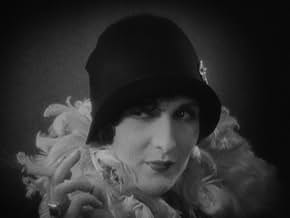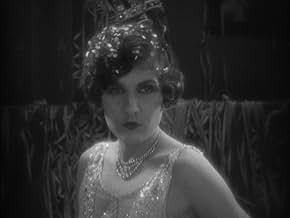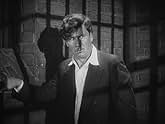AVALIAÇÃO DA IMDb
7,5/10
3,7 mil
SUA AVALIAÇÃO
Adicionar um enredo no seu idiomaBoisterous gangster kingpin Bull Weed rehabilitates his former lawyer from his alcoholic haze, but complications arise when he falls for Weed's girlfriend.Boisterous gangster kingpin Bull Weed rehabilitates his former lawyer from his alcoholic haze, but complications arise when he falls for Weed's girlfriend.Boisterous gangster kingpin Bull Weed rehabilitates his former lawyer from his alcoholic haze, but complications arise when he falls for Weed's girlfriend.
- Direção
- Roteiristas
- Artistas
- Ganhou 1 Oscar
- 5 vitórias no total
Alfred Allen
- Judge
- (não creditado)
Shep Houghton
- Street Kid
- (não creditado)
Andy MacLennan
- One of Laughing Faces at the Ball
- (não creditado)
Ida May
- Laughing Woman at the Ball
- (não creditado)
Karl Morse
- 'High Collar' Sam
- (não creditado)
Bob Reeves
- Detective at Railroad Station
- (não creditado)
Julian Rivero
- One of Buck's Henchmen
- (não creditado)
Avaliações em destaque
The stars are beautifully photographed; the lighting sets the mood, and Ben Hecht's Academy Award winning screenplay all combine to make this the definitive "gangster picture", done before many of the elements became cliches.
One of the great joys of prohibition-era gangster films is the colorful dialogue spat out by the likes of James Cagney and Edward G. Robinson. As that element would, obviously, be missing from a silent film, I wasn't sure how I would react to Underworld.
Not to worry. This is a great film, one of the best prohibition-era gangster films I've seen, ranking slightly ahead of Little Caesar and the Public Enemy, and maybe only slightly below Scarface (1932). Tough, tense, tightly written--interestingly, Howard Hawks is credited for the scenario--and with gorgeous DARK cinematography and Josef von Sternberg's usual excellence in direction. I barely missed the lack of gangster-speak.
I suppose this film was a template upon which a lot of gangster films were based. It struck me while watching it how much it had in common with the Coen brothers' Miller's Crossing (1990)--a love triangle between a mob boss, his moll, and his right hand man. And it's all about the gangsters' peculiar code of ethics.
I'd rate it a perfect 10, but for a muddled and badly-handled prison break sequence, which I watched three times and still couldn't figure out. Maybe I'm just dense; maybe it was actually a genius bit of filmmaking and it just flew over my head, but for now, 9/10.
Not to worry. This is a great film, one of the best prohibition-era gangster films I've seen, ranking slightly ahead of Little Caesar and the Public Enemy, and maybe only slightly below Scarface (1932). Tough, tense, tightly written--interestingly, Howard Hawks is credited for the scenario--and with gorgeous DARK cinematography and Josef von Sternberg's usual excellence in direction. I barely missed the lack of gangster-speak.
I suppose this film was a template upon which a lot of gangster films were based. It struck me while watching it how much it had in common with the Coen brothers' Miller's Crossing (1990)--a love triangle between a mob boss, his moll, and his right hand man. And it's all about the gangsters' peculiar code of ethics.
I'd rate it a perfect 10, but for a muddled and badly-handled prison break sequence, which I watched three times and still couldn't figure out. Maybe I'm just dense; maybe it was actually a genius bit of filmmaking and it just flew over my head, but for now, 9/10.
Underworld (1927)
A lot of people avoid silent films at all costs, and I understand that totally. Many of these films are stiff, and the plots are either sentimental or obvious.
But there are many reasons to watch a good, or great, silent film. Sometimes the acting, whatever its expressive style, is really wonderful. Often the photography and editing is really terrific and sophisticated. And the stories can be fast, fresh, and even pertinent.
And finally, the silent films easiest for the uninitiated to approach are at the very end of the silent era. That would be 1927. See Joan Crawford in The Unknown for the bizarre, or Murnau's Sunrise for eloquence, or consider this film, the first major film by the soon to be legendary Josef von Sternberg. The only thing that might put off some people is the exaggerated expressions in one of the three main characters, Bull Weed. But go with that flow and you'll see not only some more subtle acting, but a sweet, violent, complex plot interweave in just an hour or so (81 minutes, though there is an 87 minute version out there if you can find it, Netflix doesn't have it). The Criterion disc version is really clean (another reason to consider this as an intro silent films, since it isn't broken up or scratched to death).
"Underworld" is filmed with visual complexity even though it lacks some of the virtuosic moving camera of Murnau. The sets are simple but convincing, and the shift in attention to the gangster side of the story, complete with guns and molls and the precursors (or pre-precursors) of film noir, is gripping. It's not as intense as the heyday of gangster films just four or five years later, but it has if anything more emotional sophistication. The story was written by the legendary Ben Hecht, which might explain some of its success.
Von Sternberg you say? Well, he was a master at creating aura, and between him and Dietrich a whole new level of starmaking savvy was born. This, as a first film, and as a last minute replacement, was expected to flop, and was released in a single New York theater. Word spread, however, and it became a hit. You can see why. Great stuff.
A lot of people avoid silent films at all costs, and I understand that totally. Many of these films are stiff, and the plots are either sentimental or obvious.
But there are many reasons to watch a good, or great, silent film. Sometimes the acting, whatever its expressive style, is really wonderful. Often the photography and editing is really terrific and sophisticated. And the stories can be fast, fresh, and even pertinent.
And finally, the silent films easiest for the uninitiated to approach are at the very end of the silent era. That would be 1927. See Joan Crawford in The Unknown for the bizarre, or Murnau's Sunrise for eloquence, or consider this film, the first major film by the soon to be legendary Josef von Sternberg. The only thing that might put off some people is the exaggerated expressions in one of the three main characters, Bull Weed. But go with that flow and you'll see not only some more subtle acting, but a sweet, violent, complex plot interweave in just an hour or so (81 minutes, though there is an 87 minute version out there if you can find it, Netflix doesn't have it). The Criterion disc version is really clean (another reason to consider this as an intro silent films, since it isn't broken up or scratched to death).
"Underworld" is filmed with visual complexity even though it lacks some of the virtuosic moving camera of Murnau. The sets are simple but convincing, and the shift in attention to the gangster side of the story, complete with guns and molls and the precursors (or pre-precursors) of film noir, is gripping. It's not as intense as the heyday of gangster films just four or five years later, but it has if anything more emotional sophistication. The story was written by the legendary Ben Hecht, which might explain some of its success.
Von Sternberg you say? Well, he was a master at creating aura, and between him and Dietrich a whole new level of starmaking savvy was born. This, as a first film, and as a last minute replacement, was expected to flop, and was released in a single New York theater. Word spread, however, and it became a hit. You can see why. Great stuff.
I am not a big fan of the gangster film; when I am in the vicinity of the crime drama I always gravitate towards noir, where the moral lesson reserved for our protagonist in crime is not simply a present awareness that this life was only paid back with suffering but a deeper glimpse of the entire karmic process that produces a life of suffering.
In a gangster film this lesson is expressed in one of two ways; the protagonist is either left a broken, doomed being whose tragic fate is envied by no one, or is purged in the fire and brimstone of a final violence. So although we have watched secretly fascinated at the social fabric in ruins, it is important, in both respects, that we leave the theater restored in ethical order. We thus assume the role of the despised public enemy; his fate is ours for having indulged the antisocial fantasy. The final taste is always gingerly bitter, and works when it does because we invested so much of ourselves in the wrong side of the fence.
So you may hear of this as a milestone in the evolution of this type of film, and it's all because of the finale. It is this cathartic vision of some urban mid-station on the road to limbo where, amid a pall of gunsmoke and broken shards of brick wall, our protagonist comes to realize folly and is purged from life almost as a hero.
It is important to note that he doesn't go out all guns blazing, but rather surrenders to the cops. He will face death, but will not be even momentarily martyred on screen; what is heroic about him, so properly old fashioned, is that he honorably extricates from his bloody fate the innocent.
You can't miss any of this if you're a fan of the gangster genre. Scarface - the original - was built on this.
There are a few other instances that exert some cinematic intrigue; the fast-cutting of faces, superimpositions, shadows across walls. But it does not match the more interesting experiments going on in silent cinema of the time, or what this man would be doing the following year.
What is so apt about all of this is the smoky, drowsily anxious mood, the sense of excited weariness at the prospect of danger. There is a brawl in what only 30 years before would have been called a saloon. It's called the 'Dreamland Cafe', and just outside a neon sign reading 'The City is Yours' flashes the grinning mobster and his moll.
In a gangster film this lesson is expressed in one of two ways; the protagonist is either left a broken, doomed being whose tragic fate is envied by no one, or is purged in the fire and brimstone of a final violence. So although we have watched secretly fascinated at the social fabric in ruins, it is important, in both respects, that we leave the theater restored in ethical order. We thus assume the role of the despised public enemy; his fate is ours for having indulged the antisocial fantasy. The final taste is always gingerly bitter, and works when it does because we invested so much of ourselves in the wrong side of the fence.
So you may hear of this as a milestone in the evolution of this type of film, and it's all because of the finale. It is this cathartic vision of some urban mid-station on the road to limbo where, amid a pall of gunsmoke and broken shards of brick wall, our protagonist comes to realize folly and is purged from life almost as a hero.
It is important to note that he doesn't go out all guns blazing, but rather surrenders to the cops. He will face death, but will not be even momentarily martyred on screen; what is heroic about him, so properly old fashioned, is that he honorably extricates from his bloody fate the innocent.
You can't miss any of this if you're a fan of the gangster genre. Scarface - the original - was built on this.
There are a few other instances that exert some cinematic intrigue; the fast-cutting of faces, superimpositions, shadows across walls. But it does not match the more interesting experiments going on in silent cinema of the time, or what this man would be doing the following year.
What is so apt about all of this is the smoky, drowsily anxious mood, the sense of excited weariness at the prospect of danger. There is a brawl in what only 30 years before would have been called a saloon. It's called the 'Dreamland Cafe', and just outside a neon sign reading 'The City is Yours' flashes the grinning mobster and his moll.
'Underworld' is the second film of Josef von Sternberg recently seen. The other being 'The Docks of New York'. Although 'Underworld' is the more historically significant of the two films, being the first gangster film and one of the earliest film noir-like films, there is a preference for 'The Docks of New York'. Both are very, very good films though. Sternberg was a fine director, evident in his collaborations with Marlene Dietrich, and George Bancroft deserves a lot more credit as an actor.
As said, 'Underworld' is a very good film. It is not one of Sternberg's best, do prefer the likes of 'Shanghai Empress', 'The Blue Angel', 'The Scarlet Empress' and 'The Devil is a Woman'. It is incredible though that this is only his third solo film, well technically the fifth but two are lost, and his distinctive style seemed not only obvious throughout but fully established, one does not usually that with directors at this early a stage, so 'Underworld' was something of an achievement.
Is 'Underworld' perfect? No as two scenes didn't quite work for me. One was the prison break sequence, which lacked the necessary tension and felt choppily staged.
The other was the ending, after the exciting shoot out it then ends on a tacked on note that is too at odds with what came before and came over as a little heavy-handed as well.
Sternberg's direction though is truly impressive, one does not expect to see direction this polished, visually beautiful or taut at such an early career stage suggestive of a director who had actually been in the profession for years beforehand (that's a compliment by the way). What immediately stands out is the production values, the settings are evocatively seedy yet made oddly attractive at the same time and the cinematography has great audacious style and gritty atmosphere. Sternberg's films always had great use of light and shadow and 'Underworld' is no exception. The music is suitably haunting.
Other than two scenes, the story was riveting with a suitably pull no punches atmosphere, some exciting moments (especially the climactic shoot-out, which is why it's a shame that how it's resolved disappoints) and some nice turns that stopped it from becoming predictable without it becoming confusing. The central relationship to me was handled fine. The performances likewise, with Bancroft showing again with his intensity that he is deserving of more credit. Clive Brook shows here how his acting grew significantly from when he first started and Evelyn Brent is charming.
Concluding, very good. 8/10
As said, 'Underworld' is a very good film. It is not one of Sternberg's best, do prefer the likes of 'Shanghai Empress', 'The Blue Angel', 'The Scarlet Empress' and 'The Devil is a Woman'. It is incredible though that this is only his third solo film, well technically the fifth but two are lost, and his distinctive style seemed not only obvious throughout but fully established, one does not usually that with directors at this early a stage, so 'Underworld' was something of an achievement.
Is 'Underworld' perfect? No as two scenes didn't quite work for me. One was the prison break sequence, which lacked the necessary tension and felt choppily staged.
The other was the ending, after the exciting shoot out it then ends on a tacked on note that is too at odds with what came before and came over as a little heavy-handed as well.
Sternberg's direction though is truly impressive, one does not expect to see direction this polished, visually beautiful or taut at such an early career stage suggestive of a director who had actually been in the profession for years beforehand (that's a compliment by the way). What immediately stands out is the production values, the settings are evocatively seedy yet made oddly attractive at the same time and the cinematography has great audacious style and gritty atmosphere. Sternberg's films always had great use of light and shadow and 'Underworld' is no exception. The music is suitably haunting.
Other than two scenes, the story was riveting with a suitably pull no punches atmosphere, some exciting moments (especially the climactic shoot-out, which is why it's a shame that how it's resolved disappoints) and some nice turns that stopped it from becoming predictable without it becoming confusing. The central relationship to me was handled fine. The performances likewise, with Bancroft showing again with his intensity that he is deserving of more credit. Clive Brook shows here how his acting grew significantly from when he first started and Evelyn Brent is charming.
Concluding, very good. 8/10
Você sabia?
- CuriosidadesThe film was predicted to be a flop, was shelved by Paramount and eventually released in only one theater in New York. Screenwriter Ben Hecht demanded that his name was taken off the credits. As a result of strong word-of-mouth the movie became an enormous hit and won Hecht the first of his two Academy Awards.
- Citações
'Bull' Weed: -There was something I had to find out - - and that hour was worth more to me than my whole life.
- ConexõesFeatured in The House That Shadows Built (1931)
Principais escolhas
Faça login para avaliar e ver a lista de recomendações personalizadas
- How long is Underworld?Fornecido pela Alexa
Detalhes
- Data de lançamento
- País de origem
- Idiomas
- Também conhecido como
- Underworld
- Locações de filme
- Empresa de produção
- Consulte mais créditos da empresa na IMDbPro
Bilheteria
- Faturamento bruto nos EUA e Canadá
- US$ 1.642.194
- Tempo de duração
- 1 h 20 min(80 min)
- Mixagem de som
- Proporção
- 1.33 : 1
Contribua para esta página
Sugerir uma alteração ou adicionar conteúdo ausente

